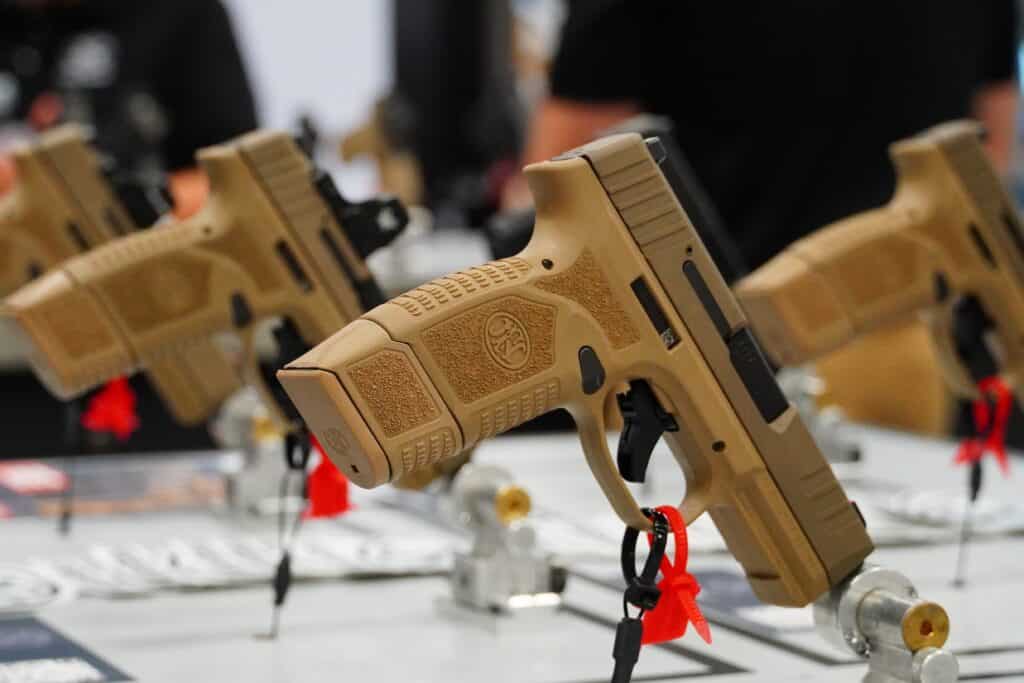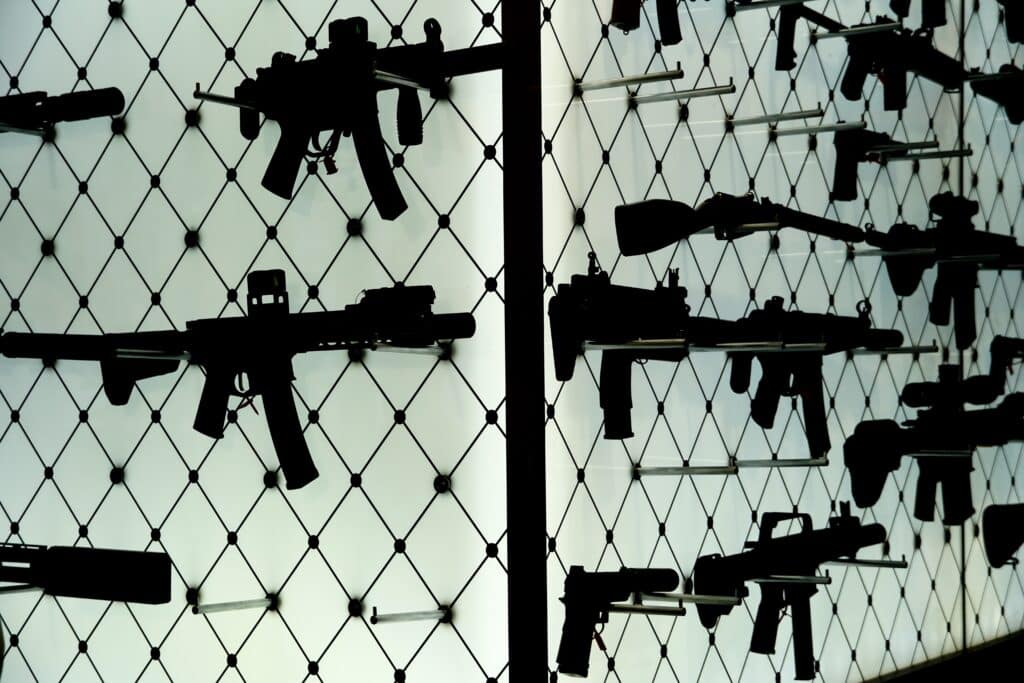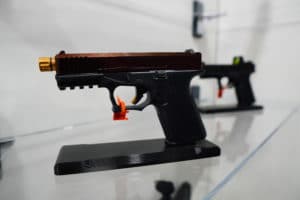I may have had a bit too much fun and eaten a bit too much junk food on the 4th because I have not been feeling great since then. But the show must go on. We haven’t taken a week off since I started The Reload, and we’re not going to start now!
Luckily, we have a great analysis piece from one of the smartest gun law thinkers in the country. George Mason University professor Robert Leider is doing his first guest piece for us this week. And it doesn’t disappoint.
Professor Leider explains how a Supreme Court ruling against the Securities and Exchange Commission implicates thousands of gun owners in an unexpected way. In fact, he argues the case will have bigger implications for gun owners than the overturning of Chevron deference.
That’s encouraging for gun-rights advocates, who likely need an uplift after the Court decided to punt on all of its remaining gun cases after handing down those decisions. Contributing Writer Jake Fogleman explains why all hope isn’t lost for them, though. He looks at Justice Clarence Thomas’s statement from the Court’s decision not to take up new gun cases for clues about where it may go from here.
Plus, Pepperdine University’s Jake Charles joins the podcast to examine SCOTUS’s Rahimi decision from a Bruen critic’s point of view.

Analysis: The SCOTUS Admin Law Case That May Impact Gun Owners More Than Overturning Chevron
By Robert Leider
On Monday, the Transportation Security Administration (TSA) plunged Indiana Republican Congresswoman Victoria Spartz into legal trouble after detecting an unloaded handgun in her baggage. Like the thousands of other Americans caught in a similar situation each year, Rep. Spartz may unexpectedly benefit from a new Supreme Court ruling against the Securities and Exchange Commission (SEC).
Just a few days before Spartz’s incident, the Supreme Court held in SEC v. Jarkesy that individuals have a right to seek trial by jury before an administrative agency imposes civil monetary penalties “designed to punish or deter the wrongdoer.” The immediate effect of this decision will likely be felt by the more than 6,700 Americans who accidentally brought a firearm into an airport checkpoint last year alone.
Technically, it is a federal felony to attempt to board a commercial aircraft while carrying a concealed weapon. But the penalties are so harsh that the federal government declines to prosecute the vast majority of cases, which involve otherwise law-abiding gun owners who forgot that they had weapons in their briefcases, purses, and other bags. Rep. Spartz claimed in a statement to the Associated Press that she mistakenly had the weapon in a pocket of her suitcase.
The TSA usually imposes civil monetary penalties instead of federal felony charges. This year, these penalties (which are indexed to inflation) can run as high as $15,000, although the TSA fines a person $3,000 for “[a] typical first offense.” Violators may also face criminal charges under state or local law.
Until Jarkesy, individuals had little recourse against a TSA fine. They could appeal within the agency. If unsuccessful, they could seek review in the courts, but judges have tended to give deference to the TSA’s findings. Using civil fines and administrative processes, TSA essentially ran its own misdemeanor justice system.
That may end. Jarkesy will likely mandate that the government cannot pursue a civil fine unless it brings a proceeding in a federal court and tries the case before a jury. These penalties are clearly intended to punish individuals who bring weapons to checkpoints. TSA even refers to them as a fine for committing “an offense.”
If a jury trial is imposed, it will be time-consuming and expensive for both the government and the defendant. And juries may produce inconsistent results. Some juries may find people in violation of the regulation, believing that gun owners are automatically responsible for the location of their weapons. Others, however, may refuse to impose liability out of sympathy with those who “forgot” that they were carrying their weapons.
The net effect on enforcement will be uncertain. On the one hand, the expense and uncertainty of bringing these cases before juries may cause the government to offer compromise civil fines on terms more favorable to gun owners. On the other, the government may try to coerce individuals to forgo civil jury trials by threatening to bring federal felony charges against those who resist paying fines. In either case, this decision is likely to have a significant practical effect on federal enforcement of the prohibition against carrying weapons into commercial airports.
However, there is still some uncertainty about whether Jarkesy will be expanded to TSA-type civil penalties. Jarkesy involved the right to a civil jury trial under the Seventh Amendment. The Supreme Court held that the defendant had a right to a jury because the SEC’s administrative action heavily resembled a traditional common-law cause of action for civil fraud. In the TSA enforcement context, the federal government may argue that there is no traditional common-law civil analogue.
And they may have a point: the nearest analogue to TSA’s enforcement is not a common-law civil cause of action but a criminal offense. Criminal offenses also require jury trials, except for some minor offenses designated as “petty.” TSA’s enforcement actions carry no imprisonment, but the fines far exceed those commonly imposed on petty offenses.
Jarkesy was not the only administrative law case handed down by the Court last week that could have an impact on gun owners. In Loper Bright Enterprises v. Raimondo, the Supreme Court overturned “Chevron deference,” a legal doctrine in which courts would often defer to executive agencies’ interpretation of statutes when those statutes were silent or ambiguous. The basic idea of Chevron deference was that courts would treat congressional silence or ambiguity as an implied delegation to administrative agencies to make rules that would resolve the ambiguities.
Gun owners may feel Loper-Bright’s impact at the margins. Some courts would use Chevron deference to defer to rules and determinations by the Bureau of Alcohol, Tobacco, Firearms, and Explosives (ATF), particularly when they thought it was a close case. In Guedes v. ATF, a DC circuit panel thought that ATF’s classification of bump stocks as machineguns deserved deference. The Supreme Court, however, ultimately overturned that decision in Cargill v. Garland, which it issued days before overturning Chevron in Loper Bright.
Of the two decisions, Loper-Bright may have the most far-reaching impact on administrative law generally, but gun owners will likely feel it less.
Most ATF regulations interpret criminal statutes, and courts have hesitated to afford Chevron deference for them. Many ATF regulations, moreover, are pursuant to express statutory delegations from Congress. These include, for example, the Gun Control Act’s importation law, which requires ATF to determine whether the firearm is generally “suitable for sporting purposes.” Loper-Bright will not affect these kinds of delegations, leaving ATF with substantial rulemaking authority.
The same can not be said for TSA civil penalties. Jarkesy will force agencies to reconsider how they bring cases in which they seek civil penalties. They will have to test many of these cases in federal courts, with defendants entitled to jury trials. That could directly impact tens of thousands of gun owners who accidentally bring their weapons to TSA security checkpoints over the next decade alone.
Podcast: Bruen Critic Law Professor Jake Charles Reacts to Rahimi Ruling [Member Early Access]
By Stephen Gutowski
In Rahimi, the Supreme Court recently handed down its first application of the Bruen test for Second Amendment cases. With the Court passing on new Second Amendment cases and remanding several in its final conference of the term, its opinion in Rahimi will be the thing most lower courts look to for guidance during at least the near future.
That’s why we had pro-gun scholar David Kopel on the show two weeks ago to give his interpretation of what the opinion means for future gun cases. It’s also why we have Bruen critic and Pepperdine University law professor Jake Charles on the show this week to give his take. We think it’s important to give you guys insight from several different perspectives on important developments like this. That way, you’re best informed about what’s going on and can make up your own mind.
Like Kopel, Charles’s writing seemed to have a direct impact on the Rahimi ruling itself. Charles has been critical of the Bruen test’s reliance on analogizing historical laws to modern regulations since the Court handed it down back in 2022. One of his primary complaints is that the lack of a certain regulation for a societal issue faced during the Founding Era implies that regulation is unconstitutional under the Second Amendment. Some of the justices, including Amy Coney Barrett, appeared to agree with that critique in Rahimi.
Charles also agreed with Justice Clarence Thomas on how the majority seemed to be rejecting the Bruen test–at least to some degree. But he wasn’t sure how much of a seachange the ruling would create in the lower courts. And he argued the Court will probably have to take up more Second Amendment cases to answer many of the questions Rahimi left unanswered.
You can listen to the show on your favorite podcast or by clicking here. Video of the episode is available on our YouTube channel. An auto-generated transcript is here. Reload Members get access on Sunday, as always. Everyone else can listen on Monday.
Claim your free 30-day trial at this week’s sponsor The Dispatch here!
Plus, Contributing writer Jake Fogleman and I discuss the Supreme Court’s refusal to take up any new Second Amendment cases ahead of next term. We then turned to a discussion of whether the demise of the Chevron doctrine makes any difference in gun rights lawsuits. Finally, we wrap up by covering a pair of novel California gun laws that went into effect this week.

Analysis: SCOTUS Passes Up Gun Ban Case… For Now [Member Exclusive]
By Jake Fogleman
Gun-rights advocates hoping the Supreme Court would finally weigh in on the question of so-called assault weapon bans were once again left disappointed this week. However, Justice Clarence Thomas offered them a lifeline.
On Tuesday, the Supreme Court cleared its plate of eight pending gun case petitions by ordering them back down to the lower courts to be reheard in light of its Rahimi decision. A separate collection of gun cases—six lawsuits collectively challenging municipal and state-level AR-15 and magazine bans in Illinois—got a different treatment. The Court flatly denied their appeals.
At first glance, that might seem like a devastating blow to gun-rights advocates fighting against hardware bans. After all, the cases dealing with prohibited person categories and New York’s legally dubious concealed carry restrictions were given the GVR treatment—suggesting the Justices are paying close attention to those issues—while the hardware ban cases were instead given the cold shoulder. Does that mean the Supreme Court is just not interested in dealing with AR-15 and magazine bans?
Not necessarily.
Alongside the Court’s denial, Justice Thomas issued a brief opinion suggesting that it was simply a matter of where the cases currently stand procedurally.
“This Court is rightly wary of taking cases in an interlocutory posture,” he wrote. “But, I hope we will consider the important issues presented by these petitions after the cases reach final judgment.”
In other words, because the challenges to Illinois’ various hardware ban regimes are only at the preliminary injunction stage rather than a full merits decision, the Court would like to respect the procedures of the lower courts it superintends before weighing in. That should not come as much of a shock to those who have been following the legal saga over the Illinois cases. The Supreme Court denied requests for its intervention on an emergency basis twice before in one of the six cases that were rejected on Tuesday.
Going beyond the procedural issues at play, however, Thomas offered gun-rights supporters some hope by opining on the importance of the Court addressing state-level hardware ban cases sooner rather than later.
“We have never squarely addressed what types of weapons are ‘Arms’ protected by the Second Amendment,” he wrote. “To be sure, we explained in District of Columbia v. Heller, that the Second Amendment’s protection ‘extends, prima facie, to all instruments that constitute bearable arms, even those that were not in existence at the time of the founding.'”
“And, we noted that ‘the Second Amendment does not protect those weapons not typically possessed by law-abiding citizens for lawful purposes,’ recognizing ‘the historical tradition of prohibiting the carrying of dangerous and unusual weapons,'” he added. “But, this minimal guidance is far from a comprehensive framework for evaluating restrictions on types of weapons, and it leaves open essential questions such as what makes a weapon ‘bearable,’ ‘dangerous,’ or ‘unusual.'”
He even took direct aim at the opinion of the Seventh Circuit Court of Appeals, which upheld Illinois’ weapon and magazine restrictions. He referred to the opinion as “nonsensical” and “unmoored from both text and history,” heavily implying that he would reverse the lower court and declare those bans unconstitutional in a hypothetical future case.
“The Seventh Circuit’s decision illustrates why this Court must provide more guidance on which weapons the Second Amendment covers,” he wrote. “In my view, Illinois’ ban is ‘highly suspect because it broadly prohibits common semiautomatic firearms used for lawful purposes.’ It is difficult to see how the Seventh Circuit could have concluded that the most widely owned semiautomatic rifles are not ‘Arms’ protected by the Second Amendment.”
He concluded his brief remarks with a stark warning for the Seventh Circuit as it considers the Illinois cases for final judgment and urged his fellow Justices to remain vigilant on the issue.
“These petitions arise from a preliminary injunction, and the Seventh Circuit stressed that its merits analysis was merely ‘a preliminary look at the subject,'” he wrote. “But, if the Seventh Circuit ultimately allows Illinois to ban America’s most common civilian rifle, we can—and should—review that decision once the cases reach a final judgment. The Court must not permit ‘the Seventh Circuit [to] relegat[e] the Second Amendment to a second-class right.'”
It’s hard to read Thomas’ comments as anything but a full-throated declaration that he understands assault weapon bans, at least as codified in the state of Illinois, to be plainly unconstitutional under the Second Amendment.
Of course, it still leaves that matter of actually getting the Court to agree to hear a hardware ban case. Given that the petition for certiorari was denied this time, at least six Justices are currently unwilling to address the issue (four votes are required to grant certiorari). Notably, no other Justices signed on to Thomas’ brief opinion regarding the Court’s denial of certiorari in the Illinois cases. Perhaps that means Thomas’ analysis of the legality of assault weapon bans isn’t shared by his peers on the Court. After all, it wouldn’t be the first time Thomas has gone further in his interpretation of the Second Amendment than the rest of his fellow Justices were comfortable with.
But there is reason to think at least some of the other conservative members of the Court are also interested in addressing the question. Justice Samuel Alito noted that he would have voted to take the Illinois cases for this upcoming term, though he did not choose to write separately on the matter himself. Additionally, Justice Brett Kavanaugh has already articulated his thoughts on why an assault weapon ban violates the Second Amendment during his time on the D.C. Circuit in a proto-Bruen text, history, and tradition analysis.
Finally, Justice Thomas staking out an early and forceful claim against a gun law that the Court declined to review, only to later have his claim addressed and vindicated by his fellow Justices, is not without precedent. He issued a dissent from denial opinion in the 2017 case Peruta v. California on the infirmities of the Golden State’s may-issue permitting regime.
“The Court’s decision to deny certiorari in this case reflects a distressing trend: the treatment of the Second Amendment as a disfavored right,” he wrote. “The Framers made a clear choice: They reserved to all Americans the right to bear arms for self-defense. I do not think we should stand by idly while a State denies its citizens that right, particularly when their very lives may depend on it.”
Five years later, Thomas authored the majority opinion in Bruen. That 6-3 ruling struck down may-issue permitting as unconstitutional nationwide.
In other words, though it is possible that the Court is uninterested in striking down state-level hardware bans, the issue could simply be a matter of it waiting for the right case at the right time. While that may frustrate gun-rights advocates, it at least offers them some hope of an eventual victory down the line.
That’s it for now.
I’ll talk to you all again soon.
Thanks,
Stephen Gutowski
Founder
The Reload







